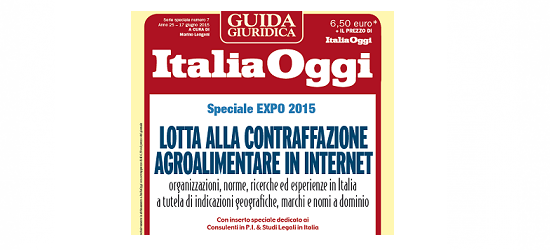
Aldo Fittante, Lawyer – Fittante Law Firm, Firenze-Bruxelles
The sector of food products and Italian wine is the most striking example of how the “Made in Italy” is the carrier of a message of quality assurance and excellence of our products in the global market that represent formidable instruments of competitiveness.
After all, I have already had the opportunity to deal, in previous essays, both with the importance of a policy of assurance of the Italian agricultural sector including appropriate strategy of brand protection (Aldo Fittante – Nino Ferrelli “Il marchio per la tutela e la valorizzazione dei prodotti agricoli e agroalimentari italiani”, Il Sole 24 Ore – Edagricole, 2010), and with how the Made in Italy should be the focus of any institutional intervention aimed at a effective and lasting economic recovery (Aldo Fittante: “Tutela giuridica del marchio, dell’industrial design e del Made in Italy, Lezioni di diritto della proprietà industriale”, Giuffrè Editore, 2015).
The great appeal of food products and Italian wine is indeed demonstrated by the increasingly pervasive and sophisticated counterfeiting with which the sector have to deal for some time.
The seriousness of the problem is amplified by the enormous expansive potentialities that, in its market, it is expected to play the web: extraordinary promotional vehicle worldwide of our authentic productions, but at the same time also means of unimaginable detrimental capabilities in the hands of those who trade false “Made in Italy“.
The online trade of Italian agricultural product worth more than one billion Euros, according to the Ministry of Agriculture, while for Coldiretti two traditional Italian food product out of three are the result of “food piracy” in the international market.
From the already famous cases of “Parmesan” and fake Chianti, the most recent example of the “Wine Kit” with false labels claiming over 24 italian wines, both PDO and PGI, or even the “Cheese-kit” that, bought from Australia for 81 Australian dollars (about 57 euro), will allow to prepare Parmesan or Pecorino Romano mixing the ingredients!
Beyond what the devious exploitation of Italian sounding hurt the business of our producers, it is the very image of our country that threatens to get out of it overwhelmed, frustrating our greatest competitive wealth and the undisputed quality of the authentically Italian productions.
The EXPO challenge, a special opportunity to make known (and recognized) our products, makes the need of protection even more compelling.
Our Country can still count on a modern and efficient system of protection.
First of all in terms of industrial property titles activated by the entrepreneur to get the exclusive on their ideas: trademarks, patents, designs, utility models, and in general all the rights of industrial property, which are declined in agri-food and wine in the PDO, PGI, TSG, IG.
Investment in industrial property, which thanks to the facilities provided by the judicial system is relatively small, it is always rewarding.
In terms of institutional response to the serious phenomenon that perpetrates the web a virtuous example – certainly be replicated in other areas – is the recent protocol signed between the Ministry of Agriculture and eBay, with which the note-commerce platform online has pledged to remove ads that imply violations related to PDO and PGI.
Conclusively our legal order – both in terms of the tools that can be activated by our entrepreneurs to get an exclusive on their excellence, both in terms of reaction to usurpative events that require a quick and decisive response – provides a system for the protection of our productions certainly modern and efficient.
